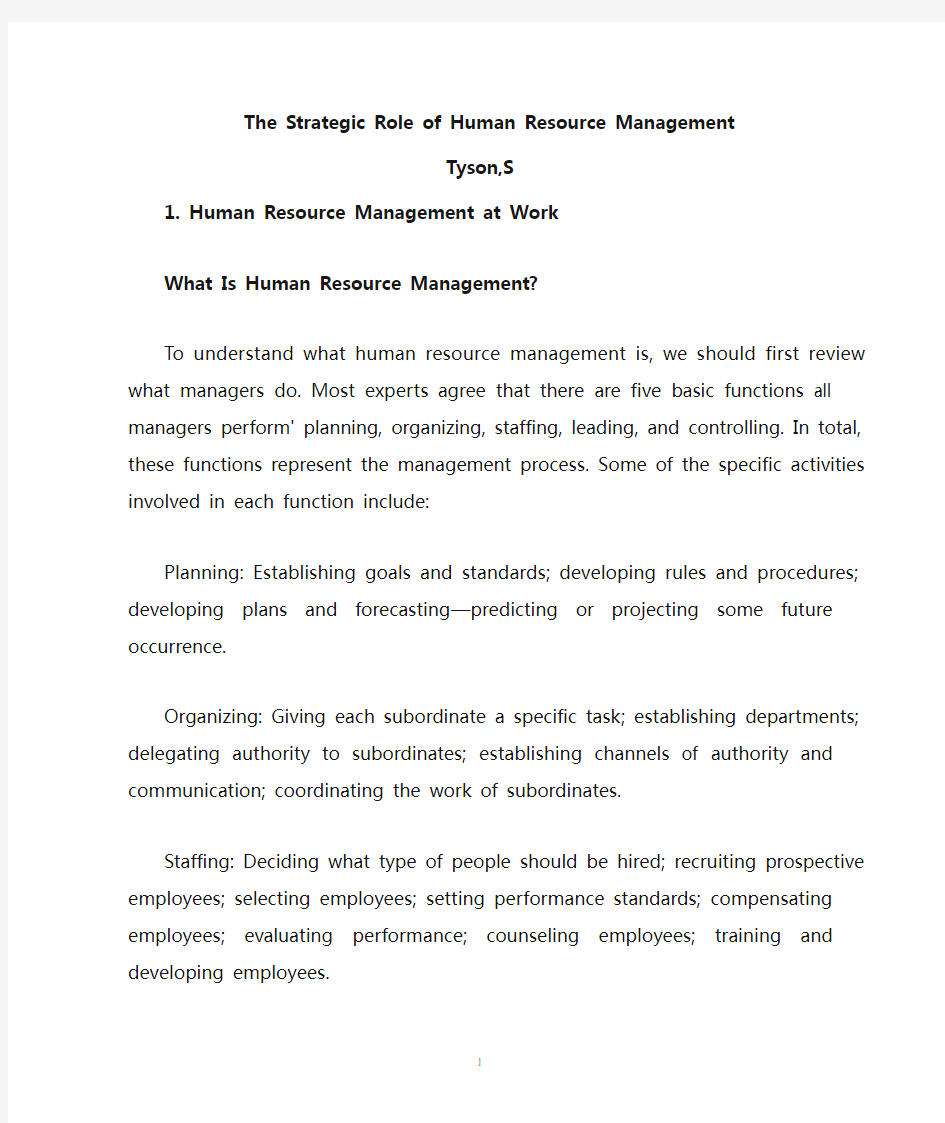外文翻译《人力资源管理的战略作用》

- 1、下载文档前请自行甄别文档内容的完整性,平台不提供额外的编辑、内容补充、找答案等附加服务。
- 2、"仅部分预览"的文档,不可在线预览部分如存在完整性等问题,可反馈申请退款(可完整预览的文档不适用该条件!)。
- 3、如文档侵犯您的权益,请联系客服反馈,我们会尽快为您处理(人工客服工作时间:9:00-18:30)。
The Strategic Role of Human Resource Management
Tyson,S
1. Human Resource Management at Work
What Is Human Resource Management?
To understand what human resource management is, we should first review what managers do. Most experts agree that there are five basic functions all managers perform' planning, organizing, staffing, leading, and controlling. In total, these functions represent the management process. Some of the specific activities involved in each function include:
Planning: Establishing goals and standards; developing rules and procedures; developing plans and forecasting—predicting or projecting some future occurrence.
Organizing: Giving each subordinate a specific task; establishing departments; delegating authority to subordinates; establishing channels of authority and communication; coordinating the work of subordinates.
Staffing: Deciding what type of people should be hired; recruiting prospective employees; selecting employees; setting performance standards; compensating employees; evaluating performance; counseling employees; training and developing employees.
Leading: Getting others to get the job done; maintaining morale; motivating subordinates.
Controlling: Setting standards such as sales quotas, quality standards, or production levels; checking to see how actual performance compares with these standards; taking corrective action as needed.
Why Is HR Management Important to All Managers?
Why are these concepts and techniques important to all managers? Perhaps it's easier to answer this by listing some of the personnel mistakes you don't want to make while managing. For example, you don't want:
To hire the wrong person for the job
To experience high turnover
To find your people not doing their best
To waste time with useless interviews
To have your company taken to court because of your discriminatory actions
To have your company cited under federal occupational safety laws for unsafe practices
To have some of your employees think their salaries are unfair and inequitable relative to others in the organization
To allow a lack of training to undermine your department's effectiveness
To commit any unfair labor practices
Remember that you could do everything else right as a manager — lay brilliant plans, draw clear organization charts, set up modern assembly lines, and use sophisticated accounting controls — but still fail as a manager by hiring the wrong people or by not motivating subordinates, for instance).On the other hand, many managers-whether presidents, generals, governors, or supervisors-have been successful even with inadequate plans, organization, or controls. They were successful because they had the knack for hiring the right people for the right jobs and motivating, appraising, and developing them.
2. Line and Staff Aspects of HRM
All managers are, in a sense, HR managers, since they all get involved in activities like recruiting, interviewing, selecting, and training. Yet most firms also have a human resource department with its own human resource manager. How do the duties of this HR manager and his or her staff relate to "line" managers' human resource duties? Let’s answer this question, starling with a short definition of line versus staff authority.
Line versus Staff Authority
Authority is the right to make decisions, to direct the work of others, and to give orders. In management, we usually distinguish between line authority and staff authority.
Line managers are authorized to direct the work of subordinates —they're always someone's boss. In addition, line managers are in charge of accomplishing the organization's basic goals (Hotel managers and the managers for production and sales are generally line managers, for example. They have direct responsibility for accomplishing the organization's basic goals. They also have the authority to direct the work of their subordinates. ) Staff managers, on the other hand, are authorized to assist and advise line managers in accomplishing these basic goals. HR managers are generally staff managers. They are responsible for advising line managers (like those for production and sales) in areas like recruiting, hiring, and compensation.
Line Managers' Human Resource Management Responsibilities
According to one expert, 'The direct handling of people is, and always has been, an integral part of every line manager's responsibility, from president down to the lowest-level supervisor.
For example, one major company outlines its line supervisors' responsibilities for effective human resource management under the following general headings: Placing the right person on the right job
Starting new employees in the organization (orientation)
Training employees for jobs that are new to them
